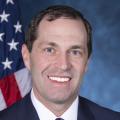Adams County
Not in Adams County? Find your state's guide.
Election Day is Tuesday, November 3!
The Progressive Voters Guide compiles the information that allows you to make informed decisions about the races on your ballot based on your values. Vote in every race! It’s our right and responsibility. Browse the categories at the left or select “Choose My Guide” to see races specific to you. And please share this guide with your friends and family.
Federal
Joe Biden is one of the nation’s most experienced public servants, having served as a U.S. senator from Delaware for 36 years and the U.S. vice president for eight years. Biden is running on a comprehensive progressive platform.
Biden has championed individual rights throughout his career — from spearheading the Violence Against Women Act to passing laws that expanded the definition of hate crimes to include those based on gender, sexual orientation, gender identity, and disability. Biden led the fight to pass the Brady Bill, which established the national firearms background check system, and helped secure a 10-year ban on assault weapons from 1994-2004. As vice president, Biden oversaw the implementation of one of the largest economic recovery plans in American history in 2009, saving the American automobile industry and millions of American jobs in all sectors of the economy. During the Obama/Biden administration, the United States made significant progress toward a clean energy economy and provided health coverage to millions of Americans via the passage of the Affordable Care Act — a law Biden has vowed to expand and improve.
If elected president, Biden has pledged to work to reverse the damage from the last four years of partisan obstruction and executive branch policies solely benefiting the wealthy and well-connected. Biden supports a $15-per-hour minimum wage and 12 weeks of paid family and medical leave for all workers. He also seeks to address the country's racial wealth disparity, equal opportunity, and jobs gaps by empowering small-business creation and expansion in economically disadvantaged areas. On the climate crisis, Biden proposes net-zero CO2 emissions in the U.S. by 2050 and rejoining the Paris climate accords. On the immediate front, Biden has proposed a national crisis response to the COVID-19 pandemic. Biden’s experience handling the economic recovery with Obama after the Great Recession of 2009 will inform his actions to help individuals, families, small businesses, and local and state governments that are struggling badly as a result of the botched response to the pandemic. Biden will restore the long-standing precedent that public health decisions are best made by public health professionals.
Biden has pledged to defend abortion rights, expand and protect union membership, bring together an equitable and diverse group of experts to handle the nation’s institutional racism crisis, and restore dignity to the office of president of the United States.
Biden is the clear presidential choice for progressive voters.
In this election, he faces Donald Trump — considered by progressives to be the most corrupt, incompetent, anti-progressive president in recent memory and perhaps in American history. Trump’s biggest achievement as president was forcing through a massive tax cut that overwhelmingly favored the wealthiest Americans, making the nation’s historic income-disparity problem even worse. Trump unilaterally withdrew from the Paris Climate Accords, making the U.S. one of very few countries that are not signatories. Trump’s administration has encouraged repeated unsuccessful attempts by Congress to repeal the Affordable Care Act, which has provided health coverage to millions of Americans, including a federal court challenge in the midst of the COVID-19 pandemic to dismantle the law. Trump has supported racist immigration practices that contravene international law on the treatment of refugees.
Trump’s decisions have trickled into even the most mundane things, affecting Americans on a daily basis. Trump scrapped a bill requiring airlines to disclose bag fees, blocked consumers from suing banks, ignored the growing crisis over student loans, lifted bans on transferring military equipment to local law enforcement which has exacerbated police-citizen conflicts, particularly in relation to Black Lives Matter protests, and has set off a trade war with China that has done tremendous economic damage to American agricultural producers and manufacturers.
Controversies involving Trump’s presidency are too numerous to list here but include lying about mail voting to such a degree that social media platforms have been forced to remove his misinformation, racist, sexist, and defamatory statements against his political opponents, dispatching federal police to attack protesters in unmarked vehicles, installing corrupt and incompetent tools of special interest into every level of government, nominating federal judges and Supreme Court justices who seek to overturn Roe v. Wade, banning transgender Americans from military service, helping spread baseless conspiracy theories, defending the actions of overt white supremacists and racist nationalists, downplaying the severity of the coronavirus pandemic to the public despite detailed foreknowledge of the coming disaster, pursuing diplomacy with dictators while scorning traditional American allies, and changing federal guidelines to undermine racial equality. For a more comprehensive list, we encourage you to visit the Wikipedia page for Trump administration controversies.
Evidence abounds showing that Trump never disassociated himself from his businesses and has used his office for personal enrichment. And let’s not forget he was impeached over revelations he first blocked military aid to Ukraine and then pushed its president to dig up damaging info on his political opponent as a “favor.”
Trump must not only be defeated, but the margin of victory must be so resounding as to prevent him from calling the results of the election into question as he has already pledged to do.
Joe Biden is one of the nation’s most experienced public servants, having served as a U.S. senator from Delaware for 36 years and the U.S. vice president for eight years. Biden is running on a comprehensive progressive platform.
Biden has championed individual rights throughout his career — from spearheading the Violence Against Women Act to passing laws that expanded the definition of hate crimes to include those based on gender, sexual orientation, gender identity, and disability. Biden led the fight to pass the Brady Bill, which established the national firearms background check system, and helped secure a 10-year ban on assault weapons from 1994-2004. As vice president, Biden oversaw the implementation of one of the largest economic recovery plans in American history in 2009, saving the American automobile industry and millions of American jobs in all sectors of the economy. During the Obama/Biden administration, the United States made significant progress toward a clean energy economy and provided health coverage to millions of Americans via the passage of the Affordable Care Act — a law Biden has vowed to expand and improve.
If elected president, Biden has pledged to work to reverse the damage from the last four years of partisan obstruction and executive branch policies solely benefiting the wealthy and well-connected. Biden supports a $15-per-hour minimum wage and 12 weeks of paid family and medical leave for all workers. He also seeks to address the country's racial wealth disparity, equal opportunity, and jobs gaps by empowering small-business creation and expansion in economically disadvantaged areas. On the climate crisis, Biden proposes net-zero CO2 emissions in the U.S. by 2050 and rejoining the Paris climate accords. On the immediate front, Biden has proposed a national crisis response to the COVID-19 pandemic. Biden’s experience handling the economic recovery with Obama after the Great Recession of 2009 will inform his actions to help individuals, families, small businesses, and local and state governments that are struggling badly as a result of the botched response to the pandemic. Biden will restore the long-standing precedent that public health decisions are best made by public health professionals.
Biden has pledged to defend abortion rights, expand and protect union membership, bring together an equitable and diverse group of experts to handle the nation’s institutional racism crisis, and restore dignity to the office of president of the United States.
Biden is the clear presidential choice for progressive voters.
In this election, he faces Donald Trump — considered by progressives to be the most corrupt, incompetent, anti-progressive president in recent memory and perhaps in American history. Trump’s biggest achievement as president was forcing through a massive tax cut that overwhelmingly favored the wealthiest Americans, making the nation’s historic income-disparity problem even worse. Trump unilaterally withdrew from the Paris Climate Accords, making the U.S. one of very few countries that are not signatories. Trump’s administration has encouraged repeated unsuccessful attempts by Congress to repeal the Affordable Care Act, which has provided health coverage to millions of Americans, including a federal court challenge in the midst of the COVID-19 pandemic to dismantle the law. Trump has supported racist immigration practices that contravene international law on the treatment of refugees.
Trump’s decisions have trickled into even the most mundane things, affecting Americans on a daily basis. Trump scrapped a bill requiring airlines to disclose bag fees, blocked consumers from suing banks, ignored the growing crisis over student loans, lifted bans on transferring military equipment to local law enforcement which has exacerbated police-citizen conflicts, particularly in relation to Black Lives Matter protests, and has set off a trade war with China that has done tremendous economic damage to American agricultural producers and manufacturers.
Controversies involving Trump’s presidency are too numerous to list here but include lying about mail voting to such a degree that social media platforms have been forced to remove his misinformation, racist, sexist, and defamatory statements against his political opponents, dispatching federal police to attack protesters in unmarked vehicles, installing corrupt and incompetent tools of special interest into every level of government, nominating federal judges and Supreme Court justices who seek to overturn Roe v. Wade, banning transgender Americans from military service, helping spread baseless conspiracy theories, defending the actions of overt white supremacists and racist nationalists, downplaying the severity of the coronavirus pandemic to the public despite detailed foreknowledge of the coming disaster, pursuing diplomacy with dictators while scorning traditional American allies, and changing federal guidelines to undermine racial equality. For a more comprehensive list, we encourage you to visit the Wikipedia page for Trump administration controversies.
Evidence abounds showing that Trump never disassociated himself from his businesses and has used his office for personal enrichment. And let’s not forget he was impeached over revelations he first blocked military aid to Ukraine and then pushed its president to dig up damaging info on his political opponent as a “favor.”
Trump must not only be defeated, but the margin of victory must be so resounding as to prevent him from calling the results of the election into question as he has already pledged to do.
Former Colorado Gov. and incumbent U.S. Sen. John Hickenlooper did not take the usual path into public office. After being laid off from his job as a geologist, he opened a successful brewpub. But as a small-business owner, he became involved in his community, and he ran for office. He served two terms each as mayor of Denver and governor of Colorado, using his unique perspective to bring people together to get things done.
When Hickenlooper was sworn in as governor in 2010, Colorado ranked 40th among the states in job creation. By the time Hickenlooper left office eight years later, Colorado had the #1 economy in the nation. Under Hickenlooper, when he was governor, Colorado’s economy grew without leaving Coloradans behind. Hickenlooper expanded Medicaid to cover an additional 400,000 Coloradans and cut the uninsured rate by nearly two-thirds. He signed three landmark gun safety laws in 2013 that banned high-capacity magazines and required background checks for any firearm transfer. On the environment, Hickenlooper made Colorado the first state to limit methane pollution from oil and gas wells. Working with the General Assembly, Hickenlooper signed legislation to ensure every eligible registered voter in Colorado gets a mail-in ballot, made voter registration more accessible, and pushed for numerous other election reforms that have made Colorado a model for election innovation. He also signed historic legislation granting in-state tuition to DREAMers.
Hickenlooper has vowed to improve and build on the Affordable Care Act and supports a federally administered public health coverage option. Hickenlooper recognizes the existential threat of climate change and favors a bold, science-based approach. He supports commonsense policies on gun violence, including restoring an assault weapons ban. Hickenlooper was the first governor of Colorado to apologize for the Sand Creek Massacre and has committed to listening to the voices of marginalized communities and rooting out systemic racism where it lurks in our society, from police brutality to immigration laws to racial disparities in economic status to access to quality education.
Hickenlooper is the progressive voter’s best choice for U.S. senator.
He faces incumbent U.S. Sen. Cory Gardner in this election. While in the Senate, Gardner has been a reliable Republican vote on the overwhelming majority of issues. He has supported Donald Trump’s position on votes 89% of the time, and Politico notes that Gardner is “reliably conservative on most issues.” In 2014, Gardner promised in a campaign ad to speak out when his party is wrong and called on Donald Trump to pull out of the race for president in October of 2016. Since then, however, Gardner has fully embraced Trump and was one of the first senators to endorse Trump’s reelection.
From his earliest votes in Congress, Gardner has consistently sought to repeal the Affordable Care Act. He has voted to repeal the ACA and to replace it with a bill that would dramatically decrease health care coverage and increase the cost of coverage. He was quoted at a private luncheon that failing to repeal the ACA would result in fewer donations to Republicans, suggesting he is not motivated by the common good.
Gardner has rejected most gun safety legislation throughout his career and is a top recipient of donations from the National Rifle Association. He has voted against expanding background checks to include gun show sales, which has been the law in Colorado since just after the Columbine High School shooting in 1999. He even voted against banning gun sales to people on the terrorist watch list.
In a historic change of heart, The Denver Post editorial board declared in 2019 they made a mistake in their 2014 endorsement of Gardner, stating he “has been too busy walking a political tight rope to be a leader.”
This race also has a Libertarian candidate: Raymon Doane. Doane is a Denver native who currently works for the Colorado Department of Revenue as a property tax specialist and business analyst. He previously ran for the state senate in 2016 as a Republican, and in 2018, he first filed to run for state treasurer and then for Congress against Democrat Diana DeGette as a Libertarian.
Doane’s few public statements should give voters pause. While the country has been dealing with the coronavirus outbreak, Doane was quoted as saying, “The federal government should not have to intervene on behalf of local municipalities and states that make poor decisions during a pandemic.” He also has said he thinks public health mandates should be more like “suggestions.” Additionally, among the four policy positions Doane takes on his website, one statement endorsing an unregulated Second Amendment stands out: “The government should NEVER have a monopoly on force. The U.S. Senate must … refuse to vote for any legislation which limits an American’s right to self-defense.” These kinds of statements don’t represent Colorado progressives.
Former Colorado Gov. and incumbent U.S. Sen. John Hickenlooper did not take the usual path into public office. After being laid off from his job as a geologist, he opened a successful brewpub. But as a small-business owner, he became involved in his community, and he ran for office. He served two terms each as mayor of Denver and governor of Colorado, using his unique perspective to bring people together to get things done.
When Hickenlooper was sworn in as governor in 2010, Colorado ranked 40th among the states in job creation. By the time Hickenlooper left office eight years later, Colorado had the #1 economy in the nation. Under Hickenlooper, when he was governor, Colorado’s economy grew without leaving Coloradans behind. Hickenlooper expanded Medicaid to cover an additional 400,000 Coloradans and cut the uninsured rate by nearly two-thirds. He signed three landmark gun safety laws in 2013 that banned high-capacity magazines and required background checks for any firearm transfer. On the environment, Hickenlooper made Colorado the first state to limit methane pollution from oil and gas wells. Working with the General Assembly, Hickenlooper signed legislation to ensure every eligible registered voter in Colorado gets a mail-in ballot, made voter registration more accessible, and pushed for numerous other election reforms that have made Colorado a model for election innovation. He also signed historic legislation granting in-state tuition to DREAMers.
Hickenlooper has vowed to improve and build on the Affordable Care Act and supports a federally administered public health coverage option. Hickenlooper recognizes the existential threat of climate change and favors a bold, science-based approach. He supports commonsense policies on gun violence, including restoring an assault weapons ban. Hickenlooper was the first governor of Colorado to apologize for the Sand Creek Massacre and has committed to listening to the voices of marginalized communities and rooting out systemic racism where it lurks in our society, from police brutality to immigration laws to racial disparities in economic status to access to quality education.
Hickenlooper is the progressive voter’s best choice for U.S. senator.
He faces incumbent U.S. Sen. Cory Gardner in this election. While in the Senate, Gardner has been a reliable Republican vote on the overwhelming majority of issues. He has supported Donald Trump’s position on votes 89% of the time, and Politico notes that Gardner is “reliably conservative on most issues.” In 2014, Gardner promised in a campaign ad to speak out when his party is wrong and called on Donald Trump to pull out of the race for president in October of 2016. Since then, however, Gardner has fully embraced Trump and was one of the first senators to endorse Trump’s reelection.
From his earliest votes in Congress, Gardner has consistently sought to repeal the Affordable Care Act. He has voted to repeal the ACA and to replace it with a bill that would dramatically decrease health care coverage and increase the cost of coverage. He was quoted at a private luncheon that failing to repeal the ACA would result in fewer donations to Republicans, suggesting he is not motivated by the common good.
Gardner has rejected most gun safety legislation throughout his career and is a top recipient of donations from the National Rifle Association. He has voted against expanding background checks to include gun show sales, which has been the law in Colorado since just after the Columbine High School shooting in 1999. He even voted against banning gun sales to people on the terrorist watch list.
In a historic change of heart, The Denver Post editorial board declared in 2019 they made a mistake in their 2014 endorsement of Gardner, stating he “has been too busy walking a political tight rope to be a leader.”
This race also has a Libertarian candidate: Raymon Doane. Doane is a Denver native who currently works for the Colorado Department of Revenue as a property tax specialist and business analyst. He previously ran for the state senate in 2016 as a Republican, and in 2018, he first filed to run for state treasurer and then for Congress against Democrat Diana DeGette as a Libertarian.
Doane’s few public statements should give voters pause. While the country has been dealing with the coronavirus outbreak, Doane was quoted as saying, “The federal government should not have to intervene on behalf of local municipalities and states that make poor decisions during a pandemic.” He also has said he thinks public health mandates should be more like “suggestions.” Additionally, among the four policy positions Doane takes on his website, one statement endorsing an unregulated Second Amendment stands out: “The government should NEVER have a monopoly on force. The U.S. Senate must … refuse to vote for any legislation which limits an American’s right to self-defense.” These kinds of statements don’t represent Colorado progressives.
Congress
4th Congressional District
Ike McCorkle is challenging the Republican incumbent for Colorado’s 4th Congressional District. The single father of three kids believes the people in the district deserve a representative who is dedicated to them, not the elite. In order to get Big Money out of politics, he supports a publicly funded, transparent system of campaign financing and wants to see the Supreme Court’s Citizens United ruling overturned to limit the influence of special interest groups that are buying much of our governmental leadership.
McCorkle is also an unabashed environmentalist who intends to fight for a Green New Deal not just to address the existential threat of climate change and rapidly transition energy production but to reinvest in rural America and create thousands of good-paying jobs in his district. Other policies he supports are ones that will expand equity and opportunity for everyone, including Medicare for All, tuition-free public college, reducing college debt by imposing a tax on Wall Street speculators, and a universal basic income system.
A retired Marine Corps officer and special operator who served for 18 years, six deployments, and four combat tours, McCorkle seeks to bring dignity and integrity to Congress and restore trust and confidence in government. He is a clear progressive choice who, if elected, plans to bring people with diverse backgrounds and beliefs together to build an American society where we lift each other up so that we all benefit together.
The incumbent he faces is U.S. Sen. Ken Buck, a former prosecutor and district attorney in Weld County who has been in Congress since 2014. His legal career has been marred by numerous ethical scandals, including compromising a case against Republican donors and declining to prosecute a sexual assault, instead blaming the victim. Since he has been in Congress, Buck has toed the party’s extreme right-wing line. He is anti-choice, opposes reasonable gun safety legislation, and has said that being gay is a choice. Buck also voted in favor of the 2017 tax reform bill, which heavily favored the wealthy and corporations while increasing tax burdens on the middle class. With all this in mind, Buck must not remain in office.
Ike McCorkle is challenging the Republican incumbent for Colorado’s 4th Congressional District. The single father of three kids believes the people in the district deserve a representative who is dedicated to them, not the elite. In order to get Big Money out of politics, he supports a publicly funded, transparent system of campaign financing and wants to see the Supreme Court’s Citizens United ruling overturned to limit the influence of special interest groups that are buying much of our governmental leadership.
McCorkle is also an unabashed environmentalist who intends to fight for a Green New Deal not just to address the existential threat of climate change and rapidly transition energy production but to reinvest in rural America and create thousands of good-paying jobs in his district. Other policies he supports are ones that will expand equity and opportunity for everyone, including Medicare for All, tuition-free public college, reducing college debt by imposing a tax on Wall Street speculators, and a universal basic income system.
A retired Marine Corps officer and special operator who served for 18 years, six deployments, and four combat tours, McCorkle seeks to bring dignity and integrity to Congress and restore trust and confidence in government. He is a clear progressive choice who, if elected, plans to bring people with diverse backgrounds and beliefs together to build an American society where we lift each other up so that we all benefit together.
The incumbent he faces is U.S. Sen. Ken Buck, a former prosecutor and district attorney in Weld County who has been in Congress since 2014. His legal career has been marred by numerous ethical scandals, including compromising a case against Republican donors and declining to prosecute a sexual assault, instead blaming the victim. Since he has been in Congress, Buck has toed the party’s extreme right-wing line. He is anti-choice, opposes reasonable gun safety legislation, and has said that being gay is a choice. Buck also voted in favor of the 2017 tax reform bill, which heavily favored the wealthy and corporations while increasing tax burdens on the middle class. With all this in mind, Buck must not remain in office.
6th Congressional District
Incumbent U.S. Rep. Jason Crow, a lawyer and former Army Ranger who completed three tours in Iraq and Afghanistan, is running for reelection in Colorado's 6th Congressional District. In 2018, he defeated longtime Republican incumbent Mike Coffman to become the first Democrat ever to represent this district.
Before serving in Congress, Crow spent years helping veterans like himself who struggled to receive benefits, focusing his work on veteran homelessness and substance abuse issues. Then, during his first term, Crow stepped into the national spotlight as one of the seven impeachment managers who argued for Donald Trump’s removal from office during the Senate trial. Crow made the case that Trump put both Ukraine’s safety and the U.S.’s national security at risk by withholding military aid in exchange for political favors.
Crow’s district is the most diverse in Colorado, with 1 in 5 residents being born outside the United States; Crow has said this is what makes his community such a special place to live. He supports protecting DREAMers and passing comprehensive immigration reform and has called for Immigration and Customs Enforcement (ICE) to end its contracts with private prison companies.
Crow has also focused on instituting campaign finance reform. The first bill he sponsored, the End Dark Money Act, would prevent mega-donors from being able to hide their political contributions. His other priorities include preventing gun violence, combatting the effects of climate change, ensuring small businesses are able to thrive, and fighting for a bold investment in America’s infrastructure.
Running against him is Steve House, the former chair of the Colorado Republican Party and a one-time gubernatorial candidate. He spent 35 years working in the health care industry, yet the biggest point House has made about problems in the health care system is that “we must face the facts and repeal Obamacare.” House apparently doesn’t realize that recent Republican efforts to repeal and replace what’s officially known as the Affordable Care Act—which has been a lifeline for many Americans struggling with health insurance coverage—have been cited as increasing the cost of health care coverage while also reducing coverage throughout the U.S. This kind of regressive thinking can’t be elected to office.
Incumbent U.S. Rep. Jason Crow, a lawyer and former Army Ranger who completed three tours in Iraq and Afghanistan, is running for reelection in Colorado's 6th Congressional District. In 2018, he defeated longtime Republican incumbent Mike Coffman to become the first Democrat ever to represent this district.
Before serving in Congress, Crow spent years helping veterans like himself who struggled to receive benefits, focusing his work on veteran homelessness and substance abuse issues. Then, during his first term, Crow stepped into the national spotlight as one of the seven impeachment managers who argued for Donald Trump’s removal from office during the Senate trial. Crow made the case that Trump put both Ukraine’s safety and the U.S.’s national security at risk by withholding military aid in exchange for political favors.
Crow’s district is the most diverse in Colorado, with 1 in 5 residents being born outside the United States; Crow has said this is what makes his community such a special place to live. He supports protecting DREAMers and passing comprehensive immigration reform and has called for Immigration and Customs Enforcement (ICE) to end its contracts with private prison companies.
Crow has also focused on instituting campaign finance reform. The first bill he sponsored, the End Dark Money Act, would prevent mega-donors from being able to hide their political contributions. His other priorities include preventing gun violence, combatting the effects of climate change, ensuring small businesses are able to thrive, and fighting for a bold investment in America’s infrastructure.
Running against him is Steve House, the former chair of the Colorado Republican Party and a one-time gubernatorial candidate. He spent 35 years working in the health care industry, yet the biggest point House has made about problems in the health care system is that “we must face the facts and repeal Obamacare.” House apparently doesn’t realize that recent Republican efforts to repeal and replace what’s officially known as the Affordable Care Act—which has been a lifeline for many Americans struggling with health insurance coverage—have been cited as increasing the cost of health care coverage while also reducing coverage throughout the U.S. This kind of regressive thinking can’t be elected to office.
7th Congressional District
Incumbent U.S. Rep. Ed Perlmutter is running for reelection in Colorado’s 7th Congressional District. The lifelong Jefferson County resident has been active in his representation of this district since 2006 and is well-known for his relentless brand of door-to-door retail politics. He’s held over 100 constituent meetings in local food markets — events that he calls “Government in the Grocery.”
His main priority since taking office has been improving opportunities for the area by way of fighting to make sure good jobs remain at the National Renewable Energy Lab in Golden and ensuring the completion of the VA Medical Center in Aurora for the benefit of veterans in the Rocky Mountain region.
Another focus of his has been gun safety. As vice chair of the House Gun Violence Prevention Task Force, he has supported requiring universal background checks and reinstating the federal ban on assault weapons. He also introduced legislation to address the gaps in federal gun policy by clarifying and expanding existing federal prohibitons related to mental health and other common risk factors in gun violence tragedies.
Perlmutter worked to secure passage of the historic Dodd-Frank Act, which placed much-needed regulations on Wall Street and big banks and established the Consumer Financial Protection Bureau. Other fights he has taken on include comprehensive immigration reform, a sweeping investment in America's infrastructure, and the preservation of Social Security and Medicare.
According to Georgetown University’s index, Perlmutter is one of the most bipartisan members of Congress. He is the preferred candidate in this race.
The Republican candidate he faces is Casper Stockham, who has previously run to represent the 1st and 6th Congressional Districts. His platform is that of the generic conservative Republican these days, which goes along with his parachute campaign style. He is “100% pro-life and supports President Trump’s effort to defund Planned Parenthood.” He is against “red flag” laws that keep guns away from domestic abusers and suspected violent criminals. He thinks Obamacare is “a disaster.” And he is a strong supporter of Trump, “loves his record and results,” and thinks that Trump is “winning for all of us.” These positions take us backward, not forward. We suggest voting for Perlmutter.
Incumbent U.S. Rep. Ed Perlmutter is running for reelection in Colorado’s 7th Congressional District. The lifelong Jefferson County resident has been active in his representation of this district since 2006 and is well-known for his relentless brand of door-to-door retail politics. He’s held over 100 constituent meetings in local food markets — events that he calls “Government in the Grocery.”
His main priority since taking office has been improving opportunities for the area by way of fighting to make sure good jobs remain at the National Renewable Energy Lab in Golden and ensuring the completion of the VA Medical Center in Aurora for the benefit of veterans in the Rocky Mountain region.
Another focus of his has been gun safety. As vice chair of the House Gun Violence Prevention Task Force, he has supported requiring universal background checks and reinstating the federal ban on assault weapons. He also introduced legislation to address the gaps in federal gun policy by clarifying and expanding existing federal prohibitons related to mental health and other common risk factors in gun violence tragedies.
Perlmutter worked to secure passage of the historic Dodd-Frank Act, which placed much-needed regulations on Wall Street and big banks and established the Consumer Financial Protection Bureau. Other fights he has taken on include comprehensive immigration reform, a sweeping investment in America's infrastructure, and the preservation of Social Security and Medicare.
According to Georgetown University’s index, Perlmutter is one of the most bipartisan members of Congress. He is the preferred candidate in this race.
The Republican candidate he faces is Casper Stockham, who has previously run to represent the 1st and 6th Congressional Districts. His platform is that of the generic conservative Republican these days, which goes along with his parachute campaign style. He is “100% pro-life and supports President Trump’s effort to defund Planned Parenthood.” He is against “red flag” laws that keep guns away from domestic abusers and suspected violent criminals. He thinks Obamacare is “a disaster.” And he is a strong supporter of Trump, “loves his record and results,” and thinks that Trump is “winning for all of us.” These positions take us backward, not forward. We suggest voting for Perlmutter.
Board of Education, 7th Congressional District
Depending on where you live, you may have one of the below board of education races on your ballot.
Karla Esser is an educator through and through. Her career is a prime example of someone who has seen every aspect of the education system, having spent time as a teacher, college professor, school administrator, and assistant superintendent. Esser has seen it all when it comes to education, and we desperately need someone with her experience guiding those decisions in Colorado. She has a strong recommendation.
Her opponent, Nancy Pallozzi, is a small business owner in Lakewood and has no experience for the school board that compares with Esser’s. Neither Pallozzi’s social media nor her website say much if anything at all about education or ideas about what she’d do in office, although the one-time middle-school PTA president does have a lot of right-wing thoughts. She appears to be just another Republican candidate on the ballot.
Karla Esser is an educator through and through. Her career is a prime example of someone who has seen every aspect of the education system, having spent time as a teacher, college professor, school administrator, and assistant superintendent. Esser has seen it all when it comes to education, and we desperately need someone with her experience guiding those decisions in Colorado. She has a strong recommendation.
Her opponent, Nancy Pallozzi, is a small business owner in Lakewood and has no experience for the school board that compares with Esser’s. Neither Pallozzi’s social media nor her website say much if anything at all about education or ideas about what she’d do in office, although the one-time middle-school PTA president does have a lot of right-wing thoughts. She appears to be just another Republican candidate on the ballot.
University of Colorado Board of Regents
Ilana Spiegel is a highly experienced and well-respected grassroots organizer, columnist, and public education advocate. A mother and a former public school teacher, her platform emphasizes accessibility in higher education, opportunity, affordability, and inclusivity. Her history as a staff developer, coach, and consultant demonstrates that she will follow through on her promise to “fight for Colorado students and families.”
Spiegel’s organizing led to the creation of the Standards and Assessment Task Force, where she worked with stakeholders on legislation to improve standardized testing in Colorado. Spiegel also spearheaded groups such as Taxpayers for Public Education and SPEAK for Cherry Creek to oppose a conservative-majority school board in Douglas County that threatened the vitality of public education. Spiegel organized and spoke at a 2017 teach-in to educate the public about and protest an ALEC (American Legislative Exchange Council) conference where Betsy DeVos was a speaker.
Her fierce advocacy and organizing work proves she will stand for progressive values by fighting rising tuition, encouraging academic freedom, and making higher education more accessible and diverse.
She faces Republican Richard Murray and the Unity Party’s Robert Worthey. Murray is an attorney from Highlands Ranch and frequently refers to his desire to run for regent because of his “double buff” status. While he does say that he’s worried about the cost of college, he seems to have more ideas about how to make CU’s football team better than he does about the cost of higher education. We think voters should not vote for Murray.
Worthey is a music teacher and former Green Party candidate for the 6th Congressional District. He is now running with the independent Unity Party, whose platform mostly reflects a Republican or conservative agenda. He seems to have no published policy positions or public statements reflecting what he would do once he’s in office.
We recommend voting for Spiegel, a candidate whose agenda aligns with our values.
Ilana Spiegel is a highly experienced and well-respected grassroots organizer, columnist, and public education advocate. A mother and a former public school teacher, her platform emphasizes accessibility in higher education, opportunity, affordability, and inclusivity. Her history as a staff developer, coach, and consultant demonstrates that she will follow through on her promise to “fight for Colorado students and families.”
Spiegel’s organizing led to the creation of the Standards and Assessment Task Force, where she worked with stakeholders on legislation to improve standardized testing in Colorado. Spiegel also spearheaded groups such as Taxpayers for Public Education and SPEAK for Cherry Creek to oppose a conservative-majority school board in Douglas County that threatened the vitality of public education. Spiegel organized and spoke at a 2017 teach-in to educate the public about and protest an ALEC (American Legislative Exchange Council) conference where Betsy DeVos was a speaker.
Her fierce advocacy and organizing work proves she will stand for progressive values by fighting rising tuition, encouraging academic freedom, and making higher education more accessible and diverse.
She faces Republican Richard Murray and the Unity Party’s Robert Worthey. Murray is an attorney from Highlands Ranch and frequently refers to his desire to run for regent because of his “double buff” status. While he does say that he’s worried about the cost of college, he seems to have more ideas about how to make CU’s football team better than he does about the cost of higher education. We think voters should not vote for Murray.
Worthey is a music teacher and former Green Party candidate for the 6th Congressional District. He is now running with the independent Unity Party, whose platform mostly reflects a Republican or conservative agenda. He seems to have no published policy positions or public statements reflecting what he would do once he’s in office.
We recommend voting for Spiegel, a candidate whose agenda aligns with our values.
Nolbert Chavez is the only candidate registered to run in this race.
Nolbert Chavez is the only candidate registered to run in this race.
State Senate
Senator, District 19
Incumbent State Sen. Rachel Zenzinger was first appointed to the District 19 seat in 2013, lost in 2014, and then returned for the win in 2016. Her original background is as an educator, but she has much experience in government and policy. She served as a council member and mayor pro tempore on the local level in Arvada and knows what kind of problems her constituents face every day. One of her main dedications is to finding bipartisan solutions — a focus that’s led to significant legislation.
That she’s naturally concerned about education is clear: Last session, she championed a bill to expand adult education and literacy programs. But her priorities are expansive, including investment in public transportation and infrastructure; securing tax credits and grants for affordable housing, particularly for low-income seniors; working to raise the minimum wage as well as delivering relief for businesses struggling during COVID-19; and finding affordable, accessible health care solutions. Groups as various as unions, the state chamber of commerce, environmental organizations, and professional associations endorse her re-election campaign.
Zenzinger is an all-around solid candidate for progressives to continue to support.
Challenging her for the seat is Republican Lynn Gerber, who worked for a long time in Adams County public schools and is a small-business owner. But while she might boast an interest in things like access to quality health care and boosting funding for teachers, progressives need to know that Gerber doesn’t want “socialized medicine” and is an adamant supporter of school choice and the Taxpayer’s Bill of Rights (TABOR). She says she wants to divert budget money to roads, but she wants that money for fixing “inefficient traffic lights” to come from “liberal politicians’ spending.” It’s a lot of conflicting talk without solutions. Meanwhile, Zenzinger has experience acting on the issues and getting successful results.
Incumbent State Sen. Rachel Zenzinger was first appointed to the District 19 seat in 2013, lost in 2014, and then returned for the win in 2016. Her original background is as an educator, but she has much experience in government and policy. She served as a council member and mayor pro tempore on the local level in Arvada and knows what kind of problems her constituents face every day. One of her main dedications is to finding bipartisan solutions — a focus that’s led to significant legislation.
That she’s naturally concerned about education is clear: Last session, she championed a bill to expand adult education and literacy programs. But her priorities are expansive, including investment in public transportation and infrastructure; securing tax credits and grants for affordable housing, particularly for low-income seniors; working to raise the minimum wage as well as delivering relief for businesses struggling during COVID-19; and finding affordable, accessible health care solutions. Groups as various as unions, the state chamber of commerce, environmental organizations, and professional associations endorse her re-election campaign.
Zenzinger is an all-around solid candidate for progressives to continue to support.
Challenging her for the seat is Republican Lynn Gerber, who worked for a long time in Adams County public schools and is a small-business owner. But while she might boast an interest in things like access to quality health care and boosting funding for teachers, progressives need to know that Gerber doesn’t want “socialized medicine” and is an adamant supporter of school choice and the Taxpayer’s Bill of Rights (TABOR). She says she wants to divert budget money to roads, but she wants that money for fixing “inefficient traffic lights” to come from “liberal politicians’ spending.” It’s a lot of conflicting talk without solutions. Meanwhile, Zenzinger has experience acting on the issues and getting successful results.
Senator, District 21
Incumbent State Sen. Dominick Moreno is has been a public servant for the area practically since the moment he graduated from Georgetown University. He has worked for the people first on the city council, at the statehouse, and now in the state senate. One of the first things he accomplished in office was instituting a universal breakfast for low-income students, and among his top priorities is fighting for working families. He’s the vice chair of the appropriations, budget, and capitol building advisory committees and worked last session on passing laws ranging from LGBTQ issues to foster care services to health insurance affordability. This is the kind of work constituents like to see, and progressive voters should feel comfortable keeping Moreno in office to do it.
Also vying for the seat is Martín Mendez, an Adams County Republican activist. His only full-fledged position on his website is being against vaccinations. Mendez seems to have no other ideas, which is all the more reason to reelect Moreno.
Incumbent State Sen. Dominick Moreno is has been a public servant for the area practically since the moment he graduated from Georgetown University. He has worked for the people first on the city council, at the statehouse, and now in the state senate. One of the first things he accomplished in office was instituting a universal breakfast for low-income students, and among his top priorities is fighting for working families. He’s the vice chair of the appropriations, budget, and capitol building advisory committees and worked last session on passing laws ranging from LGBTQ issues to foster care services to health insurance affordability. This is the kind of work constituents like to see, and progressive voters should feel comfortable keeping Moreno in office to do it.
Also vying for the seat is Martín Mendez, an Adams County Republican activist. His only full-fledged position on his website is being against vaccinations. Mendez seems to have no other ideas, which is all the more reason to reelect Moreno.
Senator, District 25
Democratic candidate Paula Dickerson is a teacher in Adams County with over three decades of firsthand experience not just with the educational system and its policies but interacting with working families on a daily basis. As she puts it, “Caring about children means caring about their families.”
Dickerson’s mission in seeking the seat, she has said, is to take back the district and make the state reprioritize. A livable wage and paid family leave are absolutely necessary. Particularly as everyone is making adjustments to COVID-19 guidelines and the economy is sliding, she recognizes that working-class women — particularly Black and Brown women — are taking big hits and cannot be left behind. She flatly says the Taxpayer’s Bill of Rights (TABOR) must be fixed in favor of a fair tax system. She wants to find a way to provide health care for all, something that’s imperative for everyday families.
With an approach that’s at the ready to make the changes necessary for a more equitable system all around now and in the future, Dickerson is the clear choice for progressive voters to support.
She is taking on incumbent State Sen. Kevin Priola. Priola is a longtime state politician in Adams County, having previously served as the state representative for District 56 before being elected to the state senate in 2016. Like several other Republicans this fall, he has the reputation of being a bipartisan legislator except on certain issues that really matter when it comes down to daily life. Priola is a strong supporter of TABOR and is committed to protecting human life “beginning at conception and ending at natural death.” While Priola may hold the experience card, a fresh voice like Dickerson’s that’s ready to speak up for fairer systems and rights for everyone would be a welcome change for progress.
Democratic candidate Paula Dickerson is a teacher in Adams County with over three decades of firsthand experience not just with the educational system and its policies but interacting with working families on a daily basis. As she puts it, “Caring about children means caring about their families.”
Dickerson’s mission in seeking the seat, she has said, is to take back the district and make the state reprioritize. A livable wage and paid family leave are absolutely necessary. Particularly as everyone is making adjustments to COVID-19 guidelines and the economy is sliding, she recognizes that working-class women — particularly Black and Brown women — are taking big hits and cannot be left behind. She flatly says the Taxpayer’s Bill of Rights (TABOR) must be fixed in favor of a fair tax system. She wants to find a way to provide health care for all, something that’s imperative for everyday families.
With an approach that’s at the ready to make the changes necessary for a more equitable system all around now and in the future, Dickerson is the clear choice for progressive voters to support.
She is taking on incumbent State Sen. Kevin Priola. Priola is a longtime state politician in Adams County, having previously served as the state representative for District 56 before being elected to the state senate in 2016. Like several other Republicans this fall, he has the reputation of being a bipartisan legislator except on certain issues that really matter when it comes down to daily life. Priola is a strong supporter of TABOR and is committed to protecting human life “beginning at conception and ending at natural death.” While Priola may hold the experience card, a fresh voice like Dickerson’s that’s ready to speak up for fairer systems and rights for everyone would be a welcome change for progress.
Senator, District 28
Janet Buckner, a current state representative, has long served the people of Aurora and the surrounding area — and now there's a good opportunity to send her to the state senate. Buckner knows what it’s like to have a working family just trying to get by, which is exactly why she sponsored bills in the legislature to help working women get paid what they are owed. She works hard to help keep insurance companies honest, and, as a former educator, she advocates for educators to be paid what they're worth and for students to be set up for success. Buckner has already shown us that she knows who sent her to the legislature, and progressive voters should support her to keep up the good work.
Karl Stecher is a retired neurosurgeon running for District 28. He only recently espoused any policy positions — one of which is a common Republican preoccupation these days of simply reelecting Donald Trump. Among his other very short statements of interest are helping home-based businesses, backing free choice for schools, and keeping “law and order.” Voters can’t get behind a short-sighted campaign like this.
Janet Buckner, a current state representative, has long served the people of Aurora and the surrounding area — and now there's a good opportunity to send her to the state senate. Buckner knows what it’s like to have a working family just trying to get by, which is exactly why she sponsored bills in the legislature to help working women get paid what they are owed. She works hard to help keep insurance companies honest, and, as a former educator, she advocates for educators to be paid what they're worth and for students to be set up for success. Buckner has already shown us that she knows who sent her to the legislature, and progressive voters should support her to keep up the good work.
Karl Stecher is a retired neurosurgeon running for District 28. He only recently espoused any policy positions — one of which is a common Republican preoccupation these days of simply reelecting Donald Trump. Among his other very short statements of interest are helping home-based businesses, backing free choice for schools, and keeping “law and order.” Voters can’t get behind a short-sighted campaign like this.
State House
Representative, District 24
Incumbent State Rep. Monica Duran won her first term in the Colorado House in 2018. She started as a grassroots activist who took her fight to the public policy arena. Her priorities are ensuring working families can thrive, improving gender and racial equity, boosting health care access, and providing for safer communities. Another focus is commonsense gun safety laws: In June, she noted in an opinion piece in The Colorado Sun that while the COVID-19 pandemic put off certain legislative measures in the works, she would not give up on a law for the safe storage of firearms.
As a survivor of domestic abuse, Duran often introduces and supports bills that protect other survivors. In particular this legislative session, she sponsored and passed a bill to make unemployment easier to access for domestic violence survivors and has raised awareness about hidden abuse during lockdown that can take place. She also advocates for the reauthorization of the Violence Against Women Act. Duran is also a strong supporter of increased mental health care services and animal rights.
In this race, Duran is by far the preferred candidate and deserves another term to keep fighting for us in the Colorado House.
She is being challenged by Laurel Imer, a Jefferson County Republican activist and the former chair of the Trump campaign for the county. Imer is clearly a fan of Trump’s, arguing that we should “end the COVID chaos,” and in a recent campaign press release named Black Lives Matter as a “domestic terrorist group.” She is supportive of Trump’s racist “America First” policy and likes to be in the company of other right-wing racists and conspiracy theorists. Voters in District 24 shouldn’t elect anyone like Imer to the state legislature.
Incumbent State Rep. Monica Duran won her first term in the Colorado House in 2018. She started as a grassroots activist who took her fight to the public policy arena. Her priorities are ensuring working families can thrive, improving gender and racial equity, boosting health care access, and providing for safer communities. Another focus is commonsense gun safety laws: In June, she noted in an opinion piece in The Colorado Sun that while the COVID-19 pandemic put off certain legislative measures in the works, she would not give up on a law for the safe storage of firearms.
As a survivor of domestic abuse, Duran often introduces and supports bills that protect other survivors. In particular this legislative session, she sponsored and passed a bill to make unemployment easier to access for domestic violence survivors and has raised awareness about hidden abuse during lockdown that can take place. She also advocates for the reauthorization of the Violence Against Women Act. Duran is also a strong supporter of increased mental health care services and animal rights.
In this race, Duran is by far the preferred candidate and deserves another term to keep fighting for us in the Colorado House.
She is being challenged by Laurel Imer, a Jefferson County Republican activist and the former chair of the Trump campaign for the county. Imer is clearly a fan of Trump’s, arguing that we should “end the COVID chaos,” and in a recent campaign press release named Black Lives Matter as a “domestic terrorist group.” She is supportive of Trump’s racist “America First” policy and likes to be in the company of other right-wing racists and conspiracy theorists. Voters in District 24 shouldn’t elect anyone like Imer to the state legislature.
Representative, District 29
Lindsey Daugherty is running for House District 29 to succeed term-limited Democratic State Rep. Tracy Kraft-Tharp. Daugherty has everything it takes to be a strong progressive voice in the Colorado House. She has worked since 2013 in her own law firm specializing in family and juvenile law, and she regularly volunteers her services to help underserved communities.
Daugherty’s campaign easily exemplifies her image as a forward-looking progressive. She has an explicit aim to work for LGBTQ people at the Capitol and stands firmly with the Black Lives Matter movement. She names access to abortion and affordable contraception as “absolute rights.” Daughterty’s views on the environment line up with the Green New Deal, aiming to boost a transition to renewable resources and investing in industries to create sustainable-energy jobs for years. And she holds that increasing funding to establish quality public schools will benefit not just students but educators, who are often paid far too low, as well.
In a great underscore to her progressive credentials, Daugherty has received endorsements from well-known U.S. Reps. Ed Perlmutter and Joe Neguse. Daugherty has easily earned a recommendation to represent District 29.
The Republican candidate vying for District 29 is Vanessa Warren-Demott. The northern Jefferson County resident says on her website that she supports mental health and transportation but offers very little detail about what she wants to do. Voters should be aware, however, of her relaying stories spouted by the QAnon conspiracy movement. In July, Demott was caught spreading the completely false Wayfair conspiracy theory that “overpriced” items on the furniture store’s website are named after missing children the company wants to sell. This ignorance of the truth is absolutely what progressives don’t want in office.
Ryan Van Gundy is a veteran and engineer in Wheat Ridge and the Libertarian candidate in this race. He has no specific public policy positions apart from running as a Libertarian. Someone who doesn’t tell you how they want to govern or legislate is someone we don’t think you should vote for.
Lindsey Daugherty is running for House District 29 to succeed term-limited Democratic State Rep. Tracy Kraft-Tharp. Daugherty has everything it takes to be a strong progressive voice in the Colorado House. She has worked since 2013 in her own law firm specializing in family and juvenile law, and she regularly volunteers her services to help underserved communities.
Daugherty’s campaign easily exemplifies her image as a forward-looking progressive. She has an explicit aim to work for LGBTQ people at the Capitol and stands firmly with the Black Lives Matter movement. She names access to abortion and affordable contraception as “absolute rights.” Daughterty’s views on the environment line up with the Green New Deal, aiming to boost a transition to renewable resources and investing in industries to create sustainable-energy jobs for years. And she holds that increasing funding to establish quality public schools will benefit not just students but educators, who are often paid far too low, as well.
In a great underscore to her progressive credentials, Daugherty has received endorsements from well-known U.S. Reps. Ed Perlmutter and Joe Neguse. Daugherty has easily earned a recommendation to represent District 29.
The Republican candidate vying for District 29 is Vanessa Warren-Demott. The northern Jefferson County resident says on her website that she supports mental health and transportation but offers very little detail about what she wants to do. Voters should be aware, however, of her relaying stories spouted by the QAnon conspiracy movement. In July, Demott was caught spreading the completely false Wayfair conspiracy theory that “overpriced” items on the furniture store’s website are named after missing children the company wants to sell. This ignorance of the truth is absolutely what progressives don’t want in office.
Ryan Van Gundy is a veteran and engineer in Wheat Ridge and the Libertarian candidate in this race. He has no specific public policy positions apart from running as a Libertarian. Someone who doesn’t tell you how they want to govern or legislate is someone we don’t think you should vote for.
Representative, District 31
Incumbent State Rep. Yadira Caraveo is already getting recognition as a progressive leader in her first term as a state lawmaker. As a practicing pediatrician, the freshman legislator says her call to political action came from her patients with the issues they faced inspiring her to run for office.
Her priorities are affordable health care, education, and affordable housing. In just one term, Caraveo has been able to pass several bills to improve the lives of Coloradans, including being the leading force to bring a bipartisan approval of the Sick Leave for Employees measure amid the COVID-19 crisis. Other successes this session included an air quality protection law that establishes per-ton fees for air pollutants and emission mitigation and a law protecting patients from abusive medical providers.
As the daughter of parents who moved to Colorado from Mexico, she has vowed to stand up for immigrants. She also has a clear stance against racial profiling practices by police, wage disparity, and other racial justice issues, such ascending the school-to-prison pipelines that plague communities and being vigilant about protecting stricter gun safety laws, particularly keeping firearms away from people in crisis or with violent criminal histories.
With all this and more — such as her push for public funding to level the playing field in politics — Caraveo is easily the progressive voters’ candidate.
Incumbent State Rep. Yadira Caraveo is already getting recognition as a progressive leader in her first term as a state lawmaker. As a practicing pediatrician, the freshman legislator says her call to political action came from her patients with the issues they faced inspiring her to run for office.
Her priorities are affordable health care, education, and affordable housing. In just one term, Caraveo has been able to pass several bills to improve the lives of Coloradans, including being the leading force to bring a bipartisan approval of the Sick Leave for Employees measure amid the COVID-19 crisis. Other successes this session included an air quality protection law that establishes per-ton fees for air pollutants and emission mitigation and a law protecting patients from abusive medical providers.
As the daughter of parents who moved to Colorado from Mexico, she has vowed to stand up for immigrants. She also has a clear stance against racial profiling practices by police, wage disparity, and other racial justice issues, such ascending the school-to-prison pipelines that plague communities and being vigilant about protecting stricter gun safety laws, particularly keeping firearms away from people in crisis or with violent criminal histories.
With all this and more — such as her push for public funding to level the playing field in politics — Caraveo is easily the progressive voters’ candidate.
Representative, District 32
Since 2017, State Rep. Adrienne Benavidez has represented District 32, and she is running for a third term. Over the last four years, she has consistently sponsored progressive legislation. Specifically in this session, she worked to improve the protection against air toxics emissions and also sponsored the bill to replace Columbus Day with Frances Xavier Cabrini Day, making Colorado the first state to name a state holiday after a woman.
Benavidez has recently prioritized issues concerning Black Lives Matter and the way police violence should be addressed in Colorado. She also banded with fellow Latino and Black Caucus members to celebrate the Supreme Court’s action against the Trump administration on the Deferred Action for Childhood Arrivals (DACA) program, saying its end “would have destroyed the lives of thousands of Colorado families” and calling on Congress for immediate permanent protections.
As the majority co-whip of the Democratic caucus, Benavidez has proven to be a leader with progressive values who deserves reelection. She is the clear choice for District 32.
Her main challenger is Republican candidate Tony Caputo. Caputo has openly expressed his disdain for the LGBTQ community, especially marriage equality. Some of his priorities are protecting freedom of speech from “political correctness,” pushing forward pro-gun policies, and seeking privatization of government departments and functions. Caputo’s campaign does not serve the diversity of Colorado nor promote equity, and as such, we cannot recommend a vote for him.
Also on the ballot is Jason Chapman, a Libertarian. He seems to have disclosed no public stances on any policies, much less those that pertain to District 32, as he lacks a campaign website or any discoverable political social media presence. Stick with the strong and experienced voice and give progressive support to Benavidez.
Since 2017, State Rep. Adrienne Benavidez has represented District 32, and she is running for a third term. Over the last four years, she has consistently sponsored progressive legislation. Specifically in this session, she worked to improve the protection against air toxics emissions and also sponsored the bill to replace Columbus Day with Frances Xavier Cabrini Day, making Colorado the first state to name a state holiday after a woman.
Benavidez has recently prioritized issues concerning Black Lives Matter and the way police violence should be addressed in Colorado. She also banded with fellow Latino and Black Caucus members to celebrate the Supreme Court’s action against the Trump administration on the Deferred Action for Childhood Arrivals (DACA) program, saying its end “would have destroyed the lives of thousands of Colorado families” and calling on Congress for immediate permanent protections.
As the majority co-whip of the Democratic caucus, Benavidez has proven to be a leader with progressive values who deserves reelection. She is the clear choice for District 32.
Her main challenger is Republican candidate Tony Caputo. Caputo has openly expressed his disdain for the LGBTQ community, especially marriage equality. Some of his priorities are protecting freedom of speech from “political correctness,” pushing forward pro-gun policies, and seeking privatization of government departments and functions. Caputo’s campaign does not serve the diversity of Colorado nor promote equity, and as such, we cannot recommend a vote for him.
Also on the ballot is Jason Chapman, a Libertarian. He seems to have disclosed no public stances on any policies, much less those that pertain to District 32, as he lacks a campaign website or any discoverable political social media presence. Stick with the strong and experienced voice and give progressive support to Benavidez.
Representative, District 33
Incumbent State Rep. Matt Gray has represented District 33 since 2017. A former deputy district attorney and public finance attorney, he has many years of experience working with local governments. Gray’s recent legislative efforts have focused on government efficiency and public finance, and he has served on the finance committee. His recent work has also addressed residential oil and gas drilling; he has repeatedly advocated for homeowners who oppose fracking in their communities and schools. Gray has also been fighting for paid family and medical leave for several legislative sessions.
Before becoming a representative, Gray served as vice chair to the Adams County Youth Initiative and chair of the Broomfield Board of Equalization, ensuring homeowners aren’t over-taxed. His work in the House also has a marked emphasis on transportation, and he has fought for regional funding equality.
Gray is the best progressive candidate to represent this district.
Mindy Quiachon, a conservative activist in Broomfield, is taking on Gray in this election. Quiachon is much like other Republicans on the ballot this cycle: She talks about grand ideas like supporting the economy but has no vision when it comes to specific ideas about problems she wants to solve. What’s worse is her criticism of things like stay-at-home orders and mask mandates — things we know for a fact protect people from COVID-19. A candidate without ideas is someone looking for power for no reason. Voters should instead reelect Gray.
Incumbent State Rep. Matt Gray has represented District 33 since 2017. A former deputy district attorney and public finance attorney, he has many years of experience working with local governments. Gray’s recent legislative efforts have focused on government efficiency and public finance, and he has served on the finance committee. His recent work has also addressed residential oil and gas drilling; he has repeatedly advocated for homeowners who oppose fracking in their communities and schools. Gray has also been fighting for paid family and medical leave for several legislative sessions.
Before becoming a representative, Gray served as vice chair to the Adams County Youth Initiative and chair of the Broomfield Board of Equalization, ensuring homeowners aren’t over-taxed. His work in the House also has a marked emphasis on transportation, and he has fought for regional funding equality.
Gray is the best progressive candidate to represent this district.
Mindy Quiachon, a conservative activist in Broomfield, is taking on Gray in this election. Quiachon is much like other Republicans on the ballot this cycle: She talks about grand ideas like supporting the economy but has no vision when it comes to specific ideas about problems she wants to solve. What’s worse is her criticism of things like stay-at-home orders and mask mandates — things we know for a fact protect people from COVID-19. A candidate without ideas is someone looking for power for no reason. Voters should instead reelect Gray.
Representative, District 34
As the only nurse in the Colorado General Assembly, incumbent State Rep. Kyle Mullica has been on the “frontlines of the coronavirus fight” both via his role as a legislator and as an EMT and nurse. In his time as a legislator, Mullica has been a leading voice on public health and protecting working families, introducing bills to curb vaping and youth nicotine use, lower prescription drug costs, and increase the number of nurses in Colorado schools.
Among Mullica’s other priorities are fighting for working families by ensuring livable wages and collective bargaining rights, better access to reproductive care, support for DREAMers, sustainable energy solutions, and more. Mullica vows to continue his progressive work in an immediate way by fighting for a smart and “just” economic return from the coronavirus pandemic and pushing forward health care reforms.
Mullica is the best candidate to continue bringing progressive values to the capitol on behalf of House District 34.
His opponent, Republican Mark Bromley, is an electrician living in Northglenn. His website boasts his support for quite a backwards agenda. He’s against vaccinations, police oversight, reforming the Taxpayer’s Bill of Rights (TABOR), red-flag laws, and gun safety in general as well as the repeal of the death penalty in Colorado. On top of all of that, he also spreads a lot of disinformation and pro-Trump propaganda. A vote for Bromley is a vote against progress in Colorado.
As the only nurse in the Colorado General Assembly, incumbent State Rep. Kyle Mullica has been on the “frontlines of the coronavirus fight” both via his role as a legislator and as an EMT and nurse. In his time as a legislator, Mullica has been a leading voice on public health and protecting working families, introducing bills to curb vaping and youth nicotine use, lower prescription drug costs, and increase the number of nurses in Colorado schools.
Among Mullica’s other priorities are fighting for working families by ensuring livable wages and collective bargaining rights, better access to reproductive care, support for DREAMers, sustainable energy solutions, and more. Mullica vows to continue his progressive work in an immediate way by fighting for a smart and “just” economic return from the coronavirus pandemic and pushing forward health care reforms.
Mullica is the best candidate to continue bringing progressive values to the capitol on behalf of House District 34.
His opponent, Republican Mark Bromley, is an electrician living in Northglenn. His website boasts his support for quite a backwards agenda. He’s against vaccinations, police oversight, reforming the Taxpayer’s Bill of Rights (TABOR), red-flag laws, and gun safety in general as well as the repeal of the death penalty in Colorado. On top of all of that, he also spreads a lot of disinformation and pro-Trump propaganda. A vote for Bromley is a vote against progress in Colorado.
Representative, District 35
Incumbent State Rep. Shannon Bird is seeking a second term representing District 35. She has longstanding experience in business, financial negotiations, and local government. Before becoming a representative, she served on the Westminster City Council, where she created an internship program and secured funding for infrastructure improvements at schools.
Bird’s legislative work to date has focused on fiscal policy, education financing, and economic development, and she is the vice chair of the House finance committee. She has also been a strong advocate for public education, particularly fair and equitable funding for schools in all neighborhoods. To help working individuals and families, Bird sponsored bills this term easing credential and licensing transferability in fields ranging from electricians to midwives and another on extending workforce development programs. She also supports DREAMers, affordable housing, and pairing law enforcement with behavioral health specialists for response calls — plus she regularly convenes virtual town halls and socially distant meetups with constituents.
She is the best candidate to lead her district forward in fighting for progressive values.
Challenging her for the seat is Republican Roger Lehman. As of the start of September, he appeared to have not spoken to the media or even created a website or social media pages explaining his campaign or his personal policy positions. If Lehman isn’t going to put his voice on any issues, then he should not be Statehouse-bound.
Incumbent State Rep. Shannon Bird is seeking a second term representing District 35. She has longstanding experience in business, financial negotiations, and local government. Before becoming a representative, she served on the Westminster City Council, where she created an internship program and secured funding for infrastructure improvements at schools.
Bird’s legislative work to date has focused on fiscal policy, education financing, and economic development, and she is the vice chair of the House finance committee. She has also been a strong advocate for public education, particularly fair and equitable funding for schools in all neighborhoods. To help working individuals and families, Bird sponsored bills this term easing credential and licensing transferability in fields ranging from electricians to midwives and another on extending workforce development programs. She also supports DREAMers, affordable housing, and pairing law enforcement with behavioral health specialists for response calls — plus she regularly convenes virtual town halls and socially distant meetups with constituents.
She is the best candidate to lead her district forward in fighting for progressive values.
Challenging her for the seat is Republican Roger Lehman. As of the start of September, he appeared to have not spoken to the media or even created a website or social media pages explaining his campaign or his personal policy positions. If Lehman isn’t going to put his voice on any issues, then he should not be Statehouse-bound.
Representative, District 36
Incumbent State Rep. Mike Weissman is running for a third term in District 36. He has been a progressive voice the last four years and has the record to prove it. On his extensive, bilingual campaign website, he backs a wide range of issues — from evidence-based criminal justice reform to transparent government to bringing Colorado schools out of the bottom of national ranking for state funding. And he has an outstanding record on issues like conservation, battling climate change, and consumer protection.
Weissman has sponsored bills concerning energy efficiency in new residential construction and changing how police and courts handle criminal defendants with mental health issues. His latest legislative session report is strong in sponsoring measures to boost veteran resources, bring counseling and behavioral health services to schools, increasing transparency in medical bills, investing in public resources like transportation, and more. He also does his best to connect with constituents.
The plain choice for progressive representation in District 36 is Weissman.
Republican Dustin Bishop is also vying for the seat. Bishop’s campaign priorities range from instituting a “flat tax rate for everyone, with no deductions” and revoking daylight saving time in Colorado. Of course, Colorado already has a flat income tax rate, and anyone running for the state legislature should already know that. In a stark stance against gun safety laws, he believes, in his own words, that “Americans have the constitutional right to own guns, and this should not be restricted by the type of gun, or the number of rounds that it can hold.” Bishop lacks the political experience and knowledge to successfully represent Coloradans. Instead, reelect Weissman.
Incumbent State Rep. Mike Weissman is running for a third term in District 36. He has been a progressive voice the last four years and has the record to prove it. On his extensive, bilingual campaign website, he backs a wide range of issues — from evidence-based criminal justice reform to transparent government to bringing Colorado schools out of the bottom of national ranking for state funding. And he has an outstanding record on issues like conservation, battling climate change, and consumer protection.
Weissman has sponsored bills concerning energy efficiency in new residential construction and changing how police and courts handle criminal defendants with mental health issues. His latest legislative session report is strong in sponsoring measures to boost veteran resources, bring counseling and behavioral health services to schools, increasing transparency in medical bills, investing in public resources like transportation, and more. He also does his best to connect with constituents.
The plain choice for progressive representation in District 36 is Weissman.
Republican Dustin Bishop is also vying for the seat. Bishop’s campaign priorities range from instituting a “flat tax rate for everyone, with no deductions” and revoking daylight saving time in Colorado. Of course, Colorado already has a flat income tax rate, and anyone running for the state legislature should already know that. In a stark stance against gun safety laws, he believes, in his own words, that “Americans have the constitutional right to own guns, and this should not be restricted by the type of gun, or the number of rounds that it can hold.” Bishop lacks the political experience and knowledge to successfully represent Coloradans. Instead, reelect Weissman.
Representative, District 48
Democratic candidate Holly Herson is a proud rural Coloradan who grew up on her family’s farm in Frederick and is now settled in Milliken. Her background is in health care, and before recently welcoming a baby, she and her wife were foster parents for troubled teens. It’s only logical that at the top of her priority list are expanding mental health services, increasing access to medical professionals, and making sure treatments are affordable. She also feels strongly that Weld County is at the forefront of being an energy leader but that innovation in alternate production is necessary to keep eastern Colorado from turning into a ghost town.
Herson has a clear passion for trying to bring change to District 48, and voters should rally behind her to do it.
Running on the Republican side is Tonya Van Beber. Lifelong Weld County resident Van Beber is an educational consultant and co-owns an excavating business with her husband. She stands solidly in the Donald Trump camp and has a pretty direct stance about how she wants to represent her district. “We are not Denver, we are not Boulder,” she declares, adding that “we don’t drive Teslas, we don’t see agriculture as a hobby, we depend on oil and gas, we eat beef.” There’s really nothing else for progressives to see here.
Democratic candidate Holly Herson is a proud rural Coloradan who grew up on her family’s farm in Frederick and is now settled in Milliken. Her background is in health care, and before recently welcoming a baby, she and her wife were foster parents for troubled teens. It’s only logical that at the top of her priority list are expanding mental health services, increasing access to medical professionals, and making sure treatments are affordable. She also feels strongly that Weld County is at the forefront of being an energy leader but that innovation in alternate production is necessary to keep eastern Colorado from turning into a ghost town.
Herson has a clear passion for trying to bring change to District 48, and voters should rally behind her to do it.
Running on the Republican side is Tonya Van Beber. Lifelong Weld County resident Van Beber is an educational consultant and co-owns an excavating business with her husband. She stands solidly in the Donald Trump camp and has a pretty direct stance about how she wants to represent her district. “We are not Denver, we are not Boulder,” she declares, adding that “we don’t drive Teslas, we don’t see agriculture as a hobby, we depend on oil and gas, we eat beef.” There’s really nothing else for progressives to see here.
Representative, District 56
Maria-Vittoria “Guigi” Carminati is a fearless advocate for women and marginalized communities, including survivors of police brutality and domestic violence. An activist and civil rights attorney, she has worked for the Texas ACLU and started her own law firm, The Woman Lawyer.
Carminati is the co-author of several books and articles in space law, is experienced in commercial and civil litigation, and has fought against family separation at the border. On top of that, she has taught at the University of Houston Law Center and helped vulnerable populations seek equity and fair treatment in the face of injustice. These are testaments to her ability to deliver on a progressive vision that prioritizes accessible housing and healthcare, public education, and criminal justice reform.
Carminati will ignite change in her district and at the Capitol, putting “progress back into progressive policy” if elected. She is the clearly preferred candidate.
She is running against Republican incumbent State Rep. Rod Bockenfeld, who was elected in 2019. Bockenfeld has a background in banking and finance. His staunch defense of law enforcement earlier this year during a debate on a police accountability bill shows he will not support progressive criminal justice reform in light of recent protests demanding change. Bockenfeld was also the lone vote against banning the so-called “gay and trans panic defense,” a measure with strong bipartisan support that protects LGBTQ folks from violence and hate crimes.
Kevin Gulbranson is also seeking the District 55 seat. He has served as outreach director of the Libertarian Party of Colorado and Arapahoe County. Gulbranson’s positions on mental health show he prioritizes individual rights and free markets. Policy stances other than those that align with the Libertarian Party are not widely known.
Maria-Vittoria “Guigi” Carminati is a fearless advocate for women and marginalized communities, including survivors of police brutality and domestic violence. An activist and civil rights attorney, she has worked for the Texas ACLU and started her own law firm, The Woman Lawyer.
Carminati is the co-author of several books and articles in space law, is experienced in commercial and civil litigation, and has fought against family separation at the border. On top of that, she has taught at the University of Houston Law Center and helped vulnerable populations seek equity and fair treatment in the face of injustice. These are testaments to her ability to deliver on a progressive vision that prioritizes accessible housing and healthcare, public education, and criminal justice reform.
Carminati will ignite change in her district and at the Capitol, putting “progress back into progressive policy” if elected. She is the clearly preferred candidate.
She is running against Republican incumbent State Rep. Rod Bockenfeld, who was elected in 2019. Bockenfeld has a background in banking and finance. His staunch defense of law enforcement earlier this year during a debate on a police accountability bill shows he will not support progressive criminal justice reform in light of recent protests demanding change. Bockenfeld was also the lone vote against banning the so-called “gay and trans panic defense,” a measure with strong bipartisan support that protects LGBTQ folks from violence and hate crimes.
Kevin Gulbranson is also seeking the District 55 seat. He has served as outreach director of the Libertarian Party of Colorado and Arapahoe County. Gulbranson’s positions on mental health show he prioritizes individual rights and free markets. Policy stances other than those that align with the Libertarian Party are not widely known.
District Attorney, 17th Judicial District
Democratic candidate Brian Mason, who is a deputy district attorney for District 17, has a long track record of seeking justice for victims of violent crime and protecting survivors. He also wants to make some very necessary changes and reforms like seeking alternatives to incarceration and finding new ways to prevent crime instead of just reacting to it. He’s listened to constituents and brought in ideas about addressing racism in the criminal justice system. It’s no surprise that most elected officials in Broomfield and Adams counties are endorsing Mason for district attorney. We also strongly recommend him as the progressive voter’s choice in this race.
His opposition, Republican Tim McCormack, currently works in the district attorney’s office in District 1, but he previously worked for District 17. McCormack certainly has a lot of experience, but his lack of emphasis on criminal justice reform and ending the school-to-prison pipeline should concern voters. Progressive voters would do well to vote for Mason instead.
Democratic candidate Brian Mason, who is a deputy district attorney for District 17, has a long track record of seeking justice for victims of violent crime and protecting survivors. He also wants to make some very necessary changes and reforms like seeking alternatives to incarceration and finding new ways to prevent crime instead of just reacting to it. He’s listened to constituents and brought in ideas about addressing racism in the criminal justice system. It’s no surprise that most elected officials in Broomfield and Adams counties are endorsing Mason for district attorney. We also strongly recommend him as the progressive voter’s choice in this race.
His opposition, Republican Tim McCormack, currently works in the district attorney’s office in District 1, but he previously worked for District 17. McCormack certainly has a lot of experience, but his lack of emphasis on criminal justice reform and ending the school-to-prison pipeline should concern voters. Progressive voters would do well to vote for Mason instead.
Statewide Ballot Measures
Amendment B, Repeal Property Tax Assessment Rates
The Gallagher Amendment Repeal and Property Tax Assessment Rates Measure (Amendment B) would repeal the Gallagher Amendment of 1982, which fixed residential and business property tax rates at 45% residential and 55% business. This measure is intended to relieve downward pressure on local public school funding across the state through the repeal of the current property tax assessment formula. The Gallagher Amendment has skewed the tax assessment of residential property in Colorado, resulting in significant shortfalls for school districts reliant on property tax revenue for their funding. Maintaining the Gallagher Amendment’s ratio of residential to business property tax has forced the state to step in with dwindling general fund revenue, causing budget cuts to critical services and an overall proportional reduction in total education funding over time.
Full text on the ballot: Without increasing property tax rates, to help preserve funding for local districts that provide fire protection, police, ambulance, hospital, kindergarten through twelfth grade education, and other services, and to avoid automatic mill levy increases, shall there be an amendment to the Colorado constitution to repeal the requirement that the general assembly periodically change the residential assessment rate in order to maintain the statewide proportion of residential property as compared to all other taxable property valued for property tax purposes and repeal the nonresidential property tax assessment rate of twenty-nine percent?
Amendment B, Repeal Property Tax Assessment Rates
The Gallagher Amendment Repeal and Property Tax Assessment Rates Measure (Amendment B) would repeal the Gallagher Amendment of 1982, which fixed residential and business property tax rates at 45% residential and 55% business. This measure is intended to relieve downward pressure on local public school funding across the state through the repeal of the current property tax assessment formula. The Gallagher Amendment has skewed the tax assessment of residential property in Colorado, resulting in significant shortfalls for school districts reliant on property tax revenue for their funding. Maintaining the Gallagher Amendment’s ratio of residential to business property tax has forced the state to step in with dwindling general fund revenue, causing budget cuts to critical services and an overall proportional reduction in total education funding over time.
Full text on the ballot: Without increasing property tax rates, to help preserve funding for local districts that provide fire protection, police, ambulance, hospital, kindergarten through twelfth grade education, and other services, and to avoid automatic mill levy increases, shall there be an amendment to the Colorado constitution to repeal the requirement that the general assembly periodically change the residential assessment rate in order to maintain the statewide proportion of residential property as compared to all other taxable property valued for property tax purposes and repeal the nonresidential property tax assessment rate of twenty-nine percent?
Amendment C, Bingo Raffles Allow Paid Help and Repeal Five-Year Minimum
The Charitable Bingo and Raffles Amendment (Amendment C) reduces the time period a charitable organization must exist before receiving a charitable gaming license from five years to three years. It also permits charitable organizations to hire staff to manage gaming activities. Charitable gaming in Colorado includes bingo, lotteries, raffles, and certain other games conducted by charitable organizations for fundraising purposes.
Full text on the ballot: Shall there be an amendment to the Colorado constitution concerning the conduct of charitable gaming activities, and, in connection therewith, allowing bingo-raffle licensees to hire managers and operators of games and reducing the required period of a charitable organization's continuous existence before obtaining a charitable gaming license?
Amendment C, Bingo Raffles Allow Paid Help and Repeal Five-Year Minimum
The Charitable Bingo and Raffles Amendment (Amendment C) reduces the time period a charitable organization must exist before receiving a charitable gaming license from five years to three years. It also permits charitable organizations to hire staff to manage gaming activities. Charitable gaming in Colorado includes bingo, lotteries, raffles, and certain other games conducted by charitable organizations for fundraising purposes.
Full text on the ballot: Shall there be an amendment to the Colorado constitution concerning the conduct of charitable gaming activities, and, in connection therewith, allowing bingo-raffle licensees to hire managers and operators of games and reducing the required period of a charitable organization's continuous existence before obtaining a charitable gaming license?
Amendment 76, Citizenship Qualification of Electors
The Citizen Requirement for Voting Initiative (Amendment 76) purports to amend Section 1 of Article VII of the Colorado Constitution to state that “only a citizen” of the United States who is 18 years of age or older can vote in federal, state, and local elections in Colorado. Currently, Article VII Section 1 of the Colorado Constitution states that “Every citizen of the United States who has attained the age of eighteen years, has resided in this state for such a time as may be prescribed by law, and has been duly registered as a voter if required by law shall be qualified to vote at all elections.” While the sole change made by the Citizen Requirement for Voting Initiative is to replace the word “every” with “only a,” it also would upend current law which allows 17-year-olds who would be 18 by the general election to vote in that cycle’s primary. This seemingly simple change, therefore, has the effect of eliminating an otherwise valid group of young voters from the full election process, to say nothing of the fact that it is a clear attempt to confuse voters into believing that current Colorado law permits noncitizens to vote, which it does not.
Full text on the ballot: Shall there be an amendment to the Colorado constitution requiring that to be qualified to vote at any election an individual must be a United States citizen?
Amendment 76, Citizenship Qualification of Electors
The Citizen Requirement for Voting Initiative (Amendment 76) purports to amend Section 1 of Article VII of the Colorado Constitution to state that “only a citizen” of the United States who is 18 years of age or older can vote in federal, state, and local elections in Colorado. Currently, Article VII Section 1 of the Colorado Constitution states that “Every citizen of the United States who has attained the age of eighteen years, has resided in this state for such a time as may be prescribed by law, and has been duly registered as a voter if required by law shall be qualified to vote at all elections.” While the sole change made by the Citizen Requirement for Voting Initiative is to replace the word “every” with “only a,” it also would upend current law which allows 17-year-olds who would be 18 by the general election to vote in that cycle’s primary. This seemingly simple change, therefore, has the effect of eliminating an otherwise valid group of young voters from the full election process, to say nothing of the fact that it is a clear attempt to confuse voters into believing that current Colorado law permits noncitizens to vote, which it does not.
Full text on the ballot: Shall there be an amendment to the Colorado constitution requiring that to be qualified to vote at any election an individual must be a United States citizen?
Progressives are split on Amendment 77, known as the Allow Voters in Central, Black Hawk, and Cripple Creek Cities to Expand Authorized Games and Increase Maximum Bets Initiative. Please read the arguments from both sides below to help you make your decision on this amendment.
Amendment 77, Local Voter Approval of Gaming Limits in Black Hawk, Central City, and Cripple Creek
The Allow Voters in Central, Black Hawk, and Cripple Creek Cities to Expand Authorized Games and Increase Maximum Bets Initiative (Amendment 77) would allow voters in these three gambling towns to vote to increase the maximum single bet allowed for any game beyond the current statewide limit of $100. Additionally, Amendment 77 would allow voters to approve games other than those currently allowed by Colorado law; currently allowed games in Colorado casinos include blackjack, craps, poker, roulette, and slot machines. The proposed measure would also change the distribution of gaming tax funds for community colleges to prioritize student retention and credit completion.
Full text on the ballot: Shall there be an amendment to the Colorado constitution and a change to the Colorado Revised Statutes concerning voter-approved changes to limited gaming, and, in connection therewith, allowing the voters of Central City, Black Hawk, and Cripple Creek, for their individual cities, to approve other games in addition to those currently allowed and increase a maximum single bet to any amount; and allowing gaming tax revenue to be used for support services to improve student retention and credential completion by students enrolled in community colleges?
Amendment 77, Local Voter Approval of Gaming Limits in Black Hawk, Central City, and Cripple Creek
The Allow Voters in Central, Black Hawk, and Cripple Creek Cities to Expand Authorized Games and Increase Maximum Bets Initiative (Amendment 77) would allow voters in these three gambling towns to vote to increase the maximum single bet allowed for any game beyond the current statewide limit of $100. Additionally, Amendment 77 would allow voters to approve games other than those currently allowed by Colorado law; currently allowed games in Colorado casinos include blackjack, craps, poker, roulette, and slot machines. The proposed measure would also change the distribution of gaming tax funds for community colleges to prioritize student retention and credit completion.
Full text on the ballot: Shall there be an amendment to the Colorado constitution and a change to the Colorado Revised Statutes concerning voter-approved changes to limited gaming, and, in connection therewith, allowing the voters of Central City, Black Hawk, and Cripple Creek, for their individual cities, to approve other games in addition to those currently allowed and increase a maximum single bet to any amount; and allowing gaming tax revenue to be used for support services to improve student retention and credential completion by students enrolled in community colleges?
Proposition EE, Cigarette, Tobacco and Nicotine Products Tax
The Colorado Tobacco and E-Cigarette Tax Increase for Health and Education Programs Measure (Proposition EE) would close a tax loophole on vaping products that currently leaves these products untaxed in Colorado, bringing the tax in line with other tobacco products. The measure would also increase cigarette taxes from $0.84 per pack currently to $2.64 per pack by 2027. The revenue from this measure would provide $375 million to public schools over the next three years to offset budget cuts from COVID-19, with $90 million specifically going to rural school districts. The revenue would also provide access to free, universal preschool to all four-year-olds in Colorado. The measure would also provide $110 million in additional money for smoking and vaping education and cessation programs as well as $35 million for affordable housing and eviction programs over the next three years.
Full text on the ballot: Shall state taxes be increased by $294,000,000 annually by imposing a tax on nicotine liquids used in e-cigarettes and other vaping products that is equal to the total state tax on tobacco products when fully phased in, incrementally increasing the tobacco products tax by up to 22% of the manufacturer's list price, incrementally increasing the cigarette tax by up to 9 cents per cigarette, expanding the existing cigarette and tobacco taxes to apply to sales to consumers from outside of the state, establishing a minimum tax for moist snuff tobacco products, creating an inventory tax that applies for future cigarette tax increases, and initially using the tax revenue primarily for public school funding to help offset revenue that has been lost as a result of the economic impacts related to COVID-19 and then for programs that reduce the use of tobacco and nicotine products, enhance the voluntary Colorado preschool program and make it widely available for free, and maintain the funding for programs that currently receive revenue from tobacco taxes, with the state keeping and spending all of the new tax revenue as a voter-approved revenue change?
Proposition EE, Cigarette, Tobacco and Nicotine Products Tax
The Colorado Tobacco and E-Cigarette Tax Increase for Health and Education Programs Measure (Proposition EE) would close a tax loophole on vaping products that currently leaves these products untaxed in Colorado, bringing the tax in line with other tobacco products. The measure would also increase cigarette taxes from $0.84 per pack currently to $2.64 per pack by 2027. The revenue from this measure would provide $375 million to public schools over the next three years to offset budget cuts from COVID-19, with $90 million specifically going to rural school districts. The revenue would also provide access to free, universal preschool to all four-year-olds in Colorado. The measure would also provide $110 million in additional money for smoking and vaping education and cessation programs as well as $35 million for affordable housing and eviction programs over the next three years.
Full text on the ballot: Shall state taxes be increased by $294,000,000 annually by imposing a tax on nicotine liquids used in e-cigarettes and other vaping products that is equal to the total state tax on tobacco products when fully phased in, incrementally increasing the tobacco products tax by up to 22% of the manufacturer's list price, incrementally increasing the cigarette tax by up to 9 cents per cigarette, expanding the existing cigarette and tobacco taxes to apply to sales to consumers from outside of the state, establishing a minimum tax for moist snuff tobacco products, creating an inventory tax that applies for future cigarette tax increases, and initially using the tax revenue primarily for public school funding to help offset revenue that has been lost as a result of the economic impacts related to COVID-19 and then for programs that reduce the use of tobacco and nicotine products, enhance the voluntary Colorado preschool program and make it widely available for free, and maintain the funding for programs that currently receive revenue from tobacco taxes, with the state keeping and spending all of the new tax revenue as a voter-approved revenue change?
Proposition 113, National Popular Vote
The Colorado National Popular Vote Interstate Compact Referendum (Proposition 113) would affirm the Colorado General Assembly’s passage of Senate Bill 19-042, which entered Colorado into the National Popular Vote Interstate Compact to ensure Colorado's Electoral College votes are awarded to the winner of the nationwide popular vote in presidential elections. Colorado has been carried by the winner of the nationwide popular vote in every presidential election since 2004, and the compact would end the unequal valuation of American votes in presidential elections. The National Popular Vote Interstate Compact would not take effect until an Electoral College majority of states joins. As of August 2020, 14 states and the District of Columbia have passed legislation that would trigger the compact in the event 270 Electoral College votes are achieved.
Full text on the ballot: Shall the following Act of the General Assembly be approved: An Act concerning adoption of an agreement among the states to elect the President of the United States by national popular vote, being Senate Bill No. 19-042?
Proposition 113, National Popular Vote
The Colorado National Popular Vote Interstate Compact Referendum (Proposition 113) would affirm the Colorado General Assembly’s passage of Senate Bill 19-042, which entered Colorado into the National Popular Vote Interstate Compact to ensure Colorado's Electoral College votes are awarded to the winner of the nationwide popular vote in presidential elections. Colorado has been carried by the winner of the nationwide popular vote in every presidential election since 2004, and the compact would end the unequal valuation of American votes in presidential elections. The National Popular Vote Interstate Compact would not take effect until an Electoral College majority of states joins. As of August 2020, 14 states and the District of Columbia have passed legislation that would trigger the compact in the event 270 Electoral College votes are achieved.
Full text on the ballot: Shall the following Act of the General Assembly be approved: An Act concerning adoption of an agreement among the states to elect the President of the United States by national popular vote, being Senate Bill No. 19-042?
Proposition 114, Restoration of Gray Wolves
The Colorado Gray Wolf Reintroduction Initiative (Proposition 114) directs the Colorado Parks and Wildlife Commission to reintroduce and manage the population of gray wolves in specific areas of the state by the end of 2023. The commission would be required to develop a plan to reintroduce gray wolves to locations west of the Continental Divide that it will determine, manage reintroduced wolf populations, and compensate property owners who may be affected. Reintroducing gray wolves in Colorado would restore an unbroken connection of protected wolf populations from Canada to Mexico.
Full text on the ballot: Shall there be a change to the Colorado Revised Statutes concerning the restoration of gray wolves through their reintroduction on designated lands in Colorado located west of the continental divide, and, in connection therewith, requiring the Colorado parks and wildlife commission, after holding statewide hearings and using scientific data, to implement a plan to restore and manage gray wolves; prohibiting the commission from imposing any land, water, or resource use restrictions on private landowners to further the plan; and requiring the commission to fairly compensate owners for losses of livestock caused by gray wolves?
Proposition 114, Restoration of Gray Wolves
The Colorado Gray Wolf Reintroduction Initiative (Proposition 114) directs the Colorado Parks and Wildlife Commission to reintroduce and manage the population of gray wolves in specific areas of the state by the end of 2023. The commission would be required to develop a plan to reintroduce gray wolves to locations west of the Continental Divide that it will determine, manage reintroduced wolf populations, and compensate property owners who may be affected. Reintroducing gray wolves in Colorado would restore an unbroken connection of protected wolf populations from Canada to Mexico.
Full text on the ballot: Shall there be a change to the Colorado Revised Statutes concerning the restoration of gray wolves through their reintroduction on designated lands in Colorado located west of the continental divide, and, in connection therewith, requiring the Colorado parks and wildlife commission, after holding statewide hearings and using scientific data, to implement a plan to restore and manage gray wolves; prohibiting the commission from imposing any land, water, or resource use restrictions on private landowners to further the plan; and requiring the commission to fairly compensate owners for losses of livestock caused by gray wolves?
Proposition 115, Prohibition on Abortions Later in Pregnancy
The Colorado 22-Week Abortion Ban Initiative (Proposition 115) would prohibit abortion procedures after 22 weeks of gestational age. Under the rule, an abortion after 22 weeks would only be permitted in an immediate life-threatening emergency with no exceptions for rape, incest, a lethal fetal diagnosis, or the health or medical needs of the patient. Abortion after 22 weeks only accounts for about 1% of total abortion procedures and in many cases is the result of major gestational complications that are found later in pregnancy. Colorado has emerged as a national safe haven for abortion care in these complex circumstances because of gestational bans in other states. Any physician who performs an abortion after 22 weeks would be found in violation of this initiative and face criminal charges and suspension of their medical license by the Colorado Medical Board.
Full text on the ballot: Shall there be a change to the Colorado Revised Statutes concerning prohibiting an abortion when the probable gestational age of the fetus is at least twenty-two weeks, and, in connection therewith, making it a misdemeanor punishable by a fine to perform or attempt to perform a prohibited abortion, except when the abortion is immediately required to save the life of the pregnant woman when her life is physically threatened, but not solely by a psychological or emotional condition; defining terms related to the measure including “probable gestational age” and “abortion,” and excepting from the definition of “abortion” medical procedures relating to miscarriage or ectopic pregnancy; specifying that a woman on whom an abortion is performed may not be charged with a crime in relation to a prohibited abortion; and requiring the Colorado medical board to suspend for at least three years the license of a licensee whom the board finds performed or attempted to perform a prohibited abortion?
Proposition 115, Prohibition on Abortions Later in Pregnancy
The Colorado 22-Week Abortion Ban Initiative (Proposition 115) would prohibit abortion procedures after 22 weeks of gestational age. Under the rule, an abortion after 22 weeks would only be permitted in an immediate life-threatening emergency with no exceptions for rape, incest, a lethal fetal diagnosis, or the health or medical needs of the patient. Abortion after 22 weeks only accounts for about 1% of total abortion procedures and in many cases is the result of major gestational complications that are found later in pregnancy. Colorado has emerged as a national safe haven for abortion care in these complex circumstances because of gestational bans in other states. Any physician who performs an abortion after 22 weeks would be found in violation of this initiative and face criminal charges and suspension of their medical license by the Colorado Medical Board.
Full text on the ballot: Shall there be a change to the Colorado Revised Statutes concerning prohibiting an abortion when the probable gestational age of the fetus is at least twenty-two weeks, and, in connection therewith, making it a misdemeanor punishable by a fine to perform or attempt to perform a prohibited abortion, except when the abortion is immediately required to save the life of the pregnant woman when her life is physically threatened, but not solely by a psychological or emotional condition; defining terms related to the measure including “probable gestational age” and “abortion,” and excepting from the definition of “abortion” medical procedures relating to miscarriage or ectopic pregnancy; specifying that a woman on whom an abortion is performed may not be charged with a crime in relation to a prohibited abortion; and requiring the Colorado medical board to suspend for at least three years the license of a licensee whom the board finds performed or attempted to perform a prohibited abortion?
Proposition 116, Decrease Income Tax Rate from 4.63% to 4.55% Initiative
The Decrease Income Tax Rate from 4.63% to 4.55% Initiative (Proposition 116) would reduce the state income tax rate for individuals and corporations, resulting in state budget cuts of over $150 million per year, forever. Large businesses and people with incomes over half a million dollars per year will receive 70% of the benefit from this tax reduction. Meanwhile, the average Colorado family will get a tax cut of only $37 per year. The state is currently facing billions of dollars in budget shortfalls due to economic contraction from the COVID-19 pandemic, and this tax cut would have to be paid for by cuts to education, public safety, health care, and transportation to the tune of over $200 million in just the first year.
Full text on the ballot: Shall there be a change to the Colorado Revised Statutes reducing the state income tax rate from 4.63% to 4.55%?
Proposition 116, Decrease Income Tax Rate from 4.63% to 4.55% Initiative
The Decrease Income Tax Rate from 4.63% to 4.55% Initiative (Proposition 116) would reduce the state income tax rate for individuals and corporations, resulting in state budget cuts of over $150 million per year, forever. Large businesses and people with incomes over half a million dollars per year will receive 70% of the benefit from this tax reduction. Meanwhile, the average Colorado family will get a tax cut of only $37 per year. The state is currently facing billions of dollars in budget shortfalls due to economic contraction from the COVID-19 pandemic, and this tax cut would have to be paid for by cuts to education, public safety, health care, and transportation to the tune of over $200 million in just the first year.
Full text on the ballot: Shall there be a change to the Colorado Revised Statutes reducing the state income tax rate from 4.63% to 4.55%?
Proposition 117, Require Voter Approval of Certain New Enterprises Exempt from TABOR Initiative
The Voter Approval of Certain New Enterprises (Proposition 117) would require a statewide vote on new state enterprises generating over $100 million in revenue within the first five years of operation. Enterprises were authorized by the 1992 Taxpayer’s Bill of Rights (TABOR) as independent entities that administer fee-based programs for specific goods and services such as unemployment insurance, road and bridge construction, cleaning up chemical waste and oil spills, the sale of hunting and fishing licenses by the Colorado Department of Parks and Wildlife, higher education institutions, and the Colorado State Fair. This initiative is entirely funded by out-of-state billionaires and corporations who often pay the fees this measure would limit. Proposition 117 is confusing and poorly written and will lead to years of lawsuits, unintended consequences, and future cuts in education, transportation, and health care.
Full text on the ballot: Shall there be a change to the Colorado Revised Statutes requiring statewide voter approval at the next even-year election of any newly created or qualified state enterprise that is exempt from the Taxpayer’s Bill of Rights, Article X, Section 20 of the Colorado constitution, if the projected or actual combined revenue from fees and surcharges of the enterprise, and all other enterprises created within the last five years that serve primarily the same purpose, is greater than $100 million within the first five fiscal years of the creation or qualification of the new enterprise?
Proposition 117, Require Voter Approval of Certain New Enterprises Exempt from TABOR Initiative
The Voter Approval of Certain New Enterprises (Proposition 117) would require a statewide vote on new state enterprises generating over $100 million in revenue within the first five years of operation. Enterprises were authorized by the 1992 Taxpayer’s Bill of Rights (TABOR) as independent entities that administer fee-based programs for specific goods and services such as unemployment insurance, road and bridge construction, cleaning up chemical waste and oil spills, the sale of hunting and fishing licenses by the Colorado Department of Parks and Wildlife, higher education institutions, and the Colorado State Fair. This initiative is entirely funded by out-of-state billionaires and corporations who often pay the fees this measure would limit. Proposition 117 is confusing and poorly written and will lead to years of lawsuits, unintended consequences, and future cuts in education, transportation, and health care.
Full text on the ballot: Shall there be a change to the Colorado Revised Statutes requiring statewide voter approval at the next even-year election of any newly created or qualified state enterprise that is exempt from the Taxpayer’s Bill of Rights, Article X, Section 20 of the Colorado constitution, if the projected or actual combined revenue from fees and surcharges of the enterprise, and all other enterprises created within the last five years that serve primarily the same purpose, is greater than $100 million within the first five fiscal years of the creation or qualification of the new enterprise?
Proposition 118, Colorado Paid Family and Medical Leave Initiative
The Colorado Paid Family and Medical Leave Initiative (Proposition 118) would establish a paid family and medical leave benefit for most Colorado workers. It would provide up to 12 weeks of paid leave, allowing 2.6 million Coloradans to take time to care for themselves, a new child, or a seriously ill family member. Eight states including California, New Jersey, and Rhode Island have successfully passed or implemented similar, solvent paid family leave programs. Employees and employers fund the program together, each contributing 0.45% of an employee’s wages to the fund, with the average Colorado worker contributing $3.83 per week. When workers need to take leave, they are paid up to 90% of their salary during that time. Employers may optionally contribute up to 100% of the cost of coverage; businesses with fewer than 10 employees are exempt from paying the premium, but their employees are still covered. Employers that offer paid leave benefits equivalent to the state plan may opt out and keep their plans.
Full text on the ballot: Shall there be a change to the Colorado Revised Statutes concerning the creation of a paid family and medical leave program in Colorado, and, in connection therewith, authorizing paid family and medical leave for a covered employee who has a serious health condition, is caring for a new child or for a family member with a serious health condition, or has a need for leave related to a family member’s military deployment or for safe leave; establishing a maximum of 12 weeks of family and medical leave, with an additional 4 weeks for pregnancy or childbirth complications, with a cap on the weekly benefit amount; requiring job protection for and prohibiting retaliation against an employee who takes paid family and medical leave; allowing a local government to opt out of the program; permitting employees of such a local government and self-employed individuals to participate in the program; exempting employers who offer an approved private paid family and medical leave plan; to pay for the program, requiring a premium of 0.9% of each employee’s wages, up to a cap, through December 31, 2024, and as set thereafter, up to 1.2% of each employee’s wages, by the director of the division of family and medical leave insurance; authorizing an employer to deduct up to 50% of the premium amount from an employee’s wages and requiring the employer to pay the remainder of the premium, with an exemption for employers with fewer than 10 employees; creating the division of family and medical leave insurance as an enterprise within the department of labor and employment to administer the program; and establishing an enforcement and appeals process for retaliation and denied claims?
Proposition 118, Colorado Paid Family and Medical Leave Initiative
The Colorado Paid Family and Medical Leave Initiative (Proposition 118) would establish a paid family and medical leave benefit for most Colorado workers. It would provide up to 12 weeks of paid leave, allowing 2.6 million Coloradans to take time to care for themselves, a new child, or a seriously ill family member. Eight states including California, New Jersey, and Rhode Island have successfully passed or implemented similar, solvent paid family leave programs. Employees and employers fund the program together, each contributing 0.45% of an employee’s wages to the fund, with the average Colorado worker contributing $3.83 per week. When workers need to take leave, they are paid up to 90% of their salary during that time. Employers may optionally contribute up to 100% of the cost of coverage; businesses with fewer than 10 employees are exempt from paying the premium, but their employees are still covered. Employers that offer paid leave benefits equivalent to the state plan may opt out and keep their plans.
Full text on the ballot: Shall there be a change to the Colorado Revised Statutes concerning the creation of a paid family and medical leave program in Colorado, and, in connection therewith, authorizing paid family and medical leave for a covered employee who has a serious health condition, is caring for a new child or for a family member with a serious health condition, or has a need for leave related to a family member’s military deployment or for safe leave; establishing a maximum of 12 weeks of family and medical leave, with an additional 4 weeks for pregnancy or childbirth complications, with a cap on the weekly benefit amount; requiring job protection for and prohibiting retaliation against an employee who takes paid family and medical leave; allowing a local government to opt out of the program; permitting employees of such a local government and self-employed individuals to participate in the program; exempting employers who offer an approved private paid family and medical leave plan; to pay for the program, requiring a premium of 0.9% of each employee’s wages, up to a cap, through December 31, 2024, and as set thereafter, up to 1.2% of each employee’s wages, by the director of the division of family and medical leave insurance; authorizing an employer to deduct up to 50% of the premium amount from an employee’s wages and requiring the employer to pay the remainder of the premium, with an exemption for employers with fewer than 10 employees; creating the division of family and medical leave insurance as an enterprise within the department of labor and employment to administer the program; and establishing an enforcement and appeals process for retaliation and denied claims?























Progressives are split on Amendment 77, known as the Allow Voters in Central, Black Hawk, and Cripple Creek Cities to Expand Authorized Games and Increase Maximum Bets Initiative. Please read the arguments from both sides below to help you make your decision on this amendment.